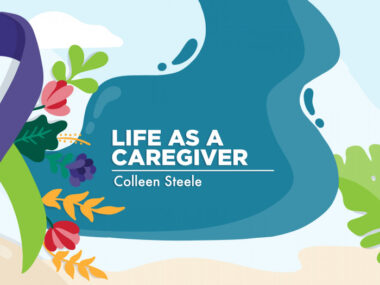Making the Difficult Decision Not to Attend a Funeral
Written by |

“Many have credited my husband, Brian, and me as the sturdy trunk supporting our little family tree. But a tree is only as strong as its roots, and ours are as strong as they come. Without the frequent and generous support of our parents, we never could have weathered the storm.”
I wrote this in a column only a few months ago. Little did I know that by the end of September, we would be grieving the unexpected passing of my mother-in-law, Naomi Steele.
She and Ron Steele, her husband of 56 years, traveled from Wisconsin to our home in Washington many times over the years. They only stopped when health issues hindered their ability to travel. Although we were states apart, their love and support remained as close as our shadows.
Naomi faithfully provided her family with unconditional love. We wished we could have made the trip to see them, but she understood and supported the reasons why we could not.
Our son Cullen has been struggling with kidney disease post transplant, and was recently challenged by the transition from pediatric to adult medical care.
My husband, Brian, works full time. Therefore, I am Cullen’s primary caregiver and am relied upon daily.
Brian has limited mobility due to injuries sustained in an automobile accident many years ago. They have caused increasing issues as he ages and often affect our lives as much as Cullen’s health challenges do.
Brian’s mother always supplied us with reassuring phone calls and prayed for us daily. She didn’t hold it against us that we couldn’t visit. What we did not expect was how much her unconditional love would comfort us when she died.
We still face the travel obstacles that kept us from visiting prior to Naomi’s passing, so attending her funeral presented a huge challenge. Sadly, our continuing health issues, combined with the current national travel restrictions and pandemic concerns, prevented us from attending. Traveling by any means would have been a great risk. A risk we believe Naomi wouldn’t have wanted us to take.
Not attending his mother’s funeral was a painful decision, but Brian was comforted by the genuine understanding of his father and siblings.
Our youngest son, Aidan, offered to fly to Wisconsin on his own and represent our family. Just as concerned for his health as we were for ours, we hesitated to agree. What helped us decide was knowing Aidan is in good health and that he would practice social distancing and wear a mask. Plus, the funeral was restricted to immediate family.
My brother-in-law, Rick Steele, and his wife, Joan, offered to pick up Aidan at the airport. They welcomed him into their home and took excellent care of him in our absence.
In my earlier column, I shared that my father-in-law expressed he was not surprised Aidan has grown into an amazing man. We couldn’t agree more, and that is why we trusted his ability to make this journey on his own.
Our sadness didn’t fade, but preparing Aidan for his trip was a pleasant distraction and relieved Brian of the guilt he felt for not attending himself. Aidan called us with updates every day, which was second-best to physically being there. Most appreciated were the offers to livestream and record the funeral. This provided much-needed closure.
Health concerns are just one of many reasons one might choose to miss a loved one’s funeral. Sadly, some families are not as understanding and supportive as ours. Making this decision can cause internal conflict and bring disapproval from family and friends.
If you are struggling with this decision, following are some things to consider:
- The health of you and your loved ones. Do not put yourself or others into a dangerous situation by forcing yourself to attend.
- Reach out to trusted family members or friends for support when making this difficult decision. If nothing else, the voice of an ally reinforcing your choice can help smooth over any ruffled feathers.
- Consider sending a proxy. Those at the funeral will feel comforted having them there, and so will you.
- Ask if the funeral can be livestreamed or recorded. It’s not the same as being there, but it can provide a feeling of closure, which is so important.
Most valuable to remember if you find yourself in this situation is that this is a time for grief, not for guilt. Shed tears, think about fond memories, and feel grateful that you have them. That is what your loved one would want most for you to do.
***
Note: Pulmonary Hypertension News is strictly a news and information website about the disease. It does not provide medical advice, diagnosis, or treatment. This content is not intended to be a substitute for professional medical advice, diagnosis, or treatment. Always seek the advice of your physician or other qualified health provider with any questions you may have regarding a medical condition. Never disregard professional medical advice or delay in seeking it because of something you have read on this website. The opinions expressed in this column are not those of Pulmonary Hypertension News or its parent company, Bionews, and are intended to spark discussion about issues pertaining to pulmonary hypertension.




Lori Dunham
It sounds like you had an incredible mother in law and she leaves a legacy of love with all of you.
Colleen Steele
Thank you for your kind words, Lori.